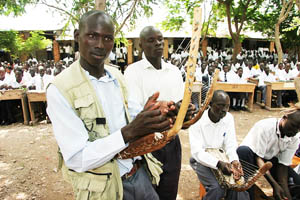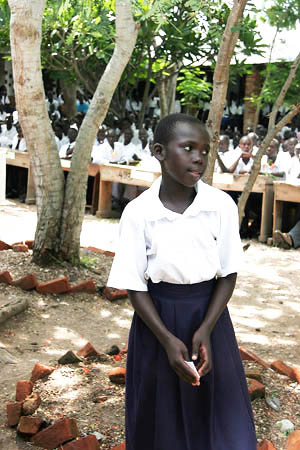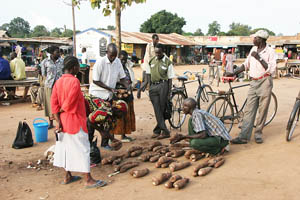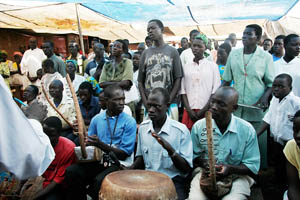Sharing the Graces of Reading
"They Come Back Singing"
The Fourth Week of Lent
|
The
refugees have suffered tremendously. I look back at the stories of Charles,
Virgilio, Cesaria, Thomas, Chaplain, Paride, and Matilde in that chapter
and I am humbled by their total trust in God. Their honesty and at times
real hunger but they never lose trust that God is with them. They literally
believe that God has intervened in their lives. Many of them lost children
or spouse but they never lose hope in God. I had to read that chapter
more than once. We all suffer and have pain/sorrow but, the depth, breadth, and duration is different for each of us. (Remembering the pity shown Fr. Gary - "You have no idea what hurt is!") (P.83) God only gives us what we we can bear and eventually learn how to share. Our greatest gift in life is our love for and of others which is born of God's love for us.(P163) Our experience of suffering unites us to each other and God. For it is in the suffering that we realize His gift to us - His love and the ability of us to love each other, with compassion. Paride's powerful statement - " I cannot leave the church because I am part of the church; to deny the Body of Christ would be to deny my experience of escape, and, as you can see, that experience has changed my life." (P152) startlingly brought forth, the realization that I too believe that, although my escape was not as his. The journey this year is bringing forth a level of sensitivity I'd lost and the definite recognition that I still don't trust God completely! I'm grateful for the time I've spent prayerfully reading/reflecting and pray for the gift of discernment and trust! Patricia, Green Cove Springs, FloridaPamela Pamela is a character which I would like to remember and cherish as an icon of many children in Africa. She carries within her hope and despair. It is unbelievable that she had travelled for 60 miles long, alone, in search of sponsorship for education. Her faith in JRS mission is a consolation. Pamela stopped me for a while and did not allow me to proceed with other chapters. More than asking for support or sponsorship for education, she wanted to know who deprived her of education and why she had to walk alone 60 miles to find a school. Finally Pamela found a school; Hakim embraced his brother Thomas Sebit, thought to be dead. These are signs of hope. Day by day my faith is tested by the lives of the refugees. Joe Xavier, Bangalore, IndiaYayo My outlook on life
has continues to change with each chapter I read. We are told that things
will make us happier. When I realize that the cost of a dinner for two
could provide one term's tuition at a JRS secondary school, skipping
an evening out and donating the cost of the dinner might assist a young
lady like Pamela. would be easy to do. It is shocking that girls do
not have feminine hygiene products and underwear and this can cause
them to miss some days at school every month. God seems to be telling
me, in all these chapters, that there is another way of life. His children
are more important than things. I now look at refugees and other needy
people with a different attitude. The refrain
from today's psalm, "The Lord is close to the brokenhearted"
immediately brought to mind the stories of the people as they escaped
from certain death in the Sudan. Every one of their stories expressed
the belief and conviction that God was with them.I am touched by their
faith and their simple certitude that they are in God's hands and He
has not let them down. I marvel that they can have such faith even if
they are the sole survivors in their family. They believe deeply that
God is with them and God will provide and they themselves enter into
their community and live their beliefs so that each is helping and supporting
the other. I continue to ask where is God in all the chaos of the world, and yet, it seems God is there if I take a moment to feel the "Presence" - the quiet touch for but a moment. This is want Gary's "people" seem to be able to do. I continue to not ask for any one thing. I would like to feel the "circle" of strength that is in the women of Oliji! What a impact that had on Gary! and me. I was very moved by the faith of the people Gary interviewed - what poetic names!!! (And he is but a "bicycle!") Their stories of loving struggle, their total dependence on God, made me feel lacking in my faith. It is so hard to have such "dependence" when surrounded by so much wealth. In many ways I am truly poorer than all these persons. Sharing the story of his dear friend's death moved me to write in the margins of the book - "Dear Monsignor S, you were (are) a friend I loved and lost. You challenged me to become a person I could never have envisioned." I will never truly know who I have affected by what I do or say. Who calls me friend? Whom do I call friend? The meaning of the word has been changed for me. Ann Z., Philadelphia This week's selections all seem to be about things we take for granted. Pamela walks for days to get to school with only 50 cents. In Omaha, we had a young boy pass away from leukemia. A few weeks ago, he was able to get his life's wish. He rode a yellow school bus to school and attended school for one day. He did not want to go to Disneyland or meet some famous sports hero, he just wanted to go to school for a day. Some American students need to see this. They skip school or are tardy and just don't care. Fr. Gary gets excited because he finally gets a warm shower after several weeks without one. He did not appreciate that convenience until it was taken away from him. In Uganda, girls who are having their menstrual period have to miss school because of a lack of access to feminine hygiene products just like in the public service announcement we see on television. It seems reminiscent of ancient times when Native Americans or the tribes of Israel had a separate place for women during this time. The part I found
the most enlightening was when the refugees told their own stories and
what it was like to lose loved ones. I wonder how often I take my wife
and children for granted or my own ability to go to work and not worry
about killing squads. It is definitely something to think about. “This
is who I am, and this is the Love that calls me into existence”
(75). This sentence follows the passage that talks about Gary’s
close call with death from the emergency appendectomy. His recovery
makes sense in light of the work that he is doing and the love and comfort
that he dispenses to the refuges, to all with whom he comes in contact.
Christine in Massachusetts I've been away for a couple of weeks, and for those following my thoughts, I appologize. I'm having my own struggles and dealing with self doubt. I received a "gentle nudge" from God yesterday to get back to my writting, but after the events of today, I have to ask if it wasn't more of a tap on the shoulder like you see in the movies where one guy just wants a better shot at the other guy's nose so he can punch him harder. Father Smith often
writes that he falls back to comfortable, familiar surroundings to regroup
and reinvigerate his will. His stress is brought about by the suffering
and "minor" squabbles going on around him and his self-doubts
in being anble to deal with them and the people who come to him for
guidance on the matters. Things he has no control over. On these trips
he often finds a sign from God that helps him get back up and carry
on. The love between a man and woman; a man and his family; a mother
and her children; the community in which he lives. The love of God always
brings him back to what is important. This week's readings left me questioning my honesty as a follower of Jesus Christ. I choose not to burden anyone with my personal spiritual journey, but rather to recall six musings of Fr. Gary which fostered within me a deep sense of selfishness and shame: "When we are compassionate...can we not say it is an incarnation in our own lives of the heart of Christ?" (p. 94). "Maybe part of the answer to why these things happen is that we are all called by God to carry our broken and battered brothers and sister on our backs." (p. 98). "There is a steely resolve in refugee children; they accept hardship and deprivation as part of daily life. They learn the truth early: life is not fair." (p. 102). "You (God) are never limited by place or time, by big or small, by simple or complex. You are not prevented by anything in the exercise of your promise of love manifested in Jesus...Obscurity is your specialty: obscure places, obscure situations, obscure people, obscure bread and wine. Nothing obstructs your grace, O God, not evil, not madness, not the chaos of nations, not the pettiness and grumbling of your servants." (p. 117). "I believe that the Spirit is constantly renewing the church; it is a river which cannot be damned. If (the church) is open" (p.119). I close with Flabius' prayer: "I came because God is great and (H)is plans, though hidden from us, are plans of love for all of us. I am here with you knowing that being with my brothers and sisters and you, Father Gary, I shall be given strength." (p. 130). Because of Calvary, Emmanuel, USA Oh goody, I have been waiting to share my favorite African story and my clincher in all of my mission presentations. It is a comparison drawn off of the story of Lucietta. Fr. Paddy had been out in the bush all day and was hot and tired. When he returned to his hut, he was greeted by two men from a village two hours away. They said that a woman in their village was dying and she wanted a priest to hear her confession. Should he believe them? Were they just looking for a ride and then disappear into the night? He couldn't take the chance and so they went. As they arrived in the village, Father was lead to a single room hut with a man and several children against one wall, a candle at the center of the room and a pile of rags against another wall. He walked over and lifted the rags. Staring back at him were huge brown eyes, set in a face with skin drawn tightly across the bones. These were the eyes and face of imminent death. The woman asked for confession and so Father cleared the room and listened to the woman's story. At the point of absolution, the woman's face lit up and her eyes sparkled and she was the most beautiful woman the priest had ever seen. She said to him, "Father, do you know that God is merciful and Christ saves? And I will be in heaven before you, but I will save you a place." Profound. Nancy Bourassa Last Thursday...I met for the first time in my life a refugee from Zimbabwe.....I was visiting one of our parishes, which is very close to the broader. Recently a 'drop in centre' has been opened for the refugees. In the same town, tomorrow ( 5th March ) I have the opportunity to visit a new JRS office and to meet the newly appointed staff. So this is the background to my reflection for this 3rd week of Lent. Yes , the image of shoes, feet will emerge. But it was the eyes of this man that has stayed with me. He sat on a bench, just staring into the space around him. The priest called him over to the car and he got in....there is the expression ' a frightened rabbit' ....his eyes started to dart around the car.. that is what he looked like , a frightened rabbit....I sat in the front and all I did was to shake his hand and greet him..hoping at least to convey the message, its okay, you are safe now.....it was then I noticed his feet...just open sandals...very worn out...he had made a very long journey....I wondered could I wear his shoes? We reached the drop in centre..where he just sat and his stare into space came again...( Here would be able to recieve a meal, a wash and a bed for the night) I was just silent and in many ways have been since this meeting as this encounter brought up many things,....I was reminded of the experince of the safe house in Dublin for the battered women of Ireland..I recalled the pain, the hurt , the fear of these women....again a sense of helplessness....a sense of being just there and not having anything really profound to say....I could see the fear in this mans eyes...he had nothing , except the clothes he was wearing..... As I travelled back...I just wondered what was it like for Jesus..while in the agony of the garden....he maybe stared, he maybe just darted his eyes around as he was moved..from place to place that night....he was told stay here..go there...he was pulled and dragged...he was hung by ropes......I wondered... he was silent,,,, So as the weeks of Lent...pass I ask myself.. am I entering into the life ,death and ressurrection of Jesus Christ in the many encounters with people I having this Lent. ? Do I dare walk in their shoes ? Can I walk in their shoes? Do I dare look into their eyes? Anita, South Africa I’m late with this reflection. The gift from this tardiness is how today’s first Mass reading, from Isaiah, connected with my attention to these beautiful people Gary Smith was sent to. The Isaiah reading promises “a new heaven and a new earth,” more concretely pictured as a place in which we will have full lifetimes, build houses and live in them, plant crops and enjoy the fruits. The words are addressed to a people in exile from their homes, deprived of the everyday joy of creating a stable home and providing for themselves and their families. As I thought about
how important it is to me to have a place that is home (on many levels),
and the times in my life when I have not felt at home where I was, I
had a new sense of the suffering exile must be. And of course that is
exactly the situation of refugees: they have lost their homes, maybe
forever. They cannot count on harvesting crops, on a place, on the presence
of loved ones. Life is so fragile here.
|
Lent with Refugees Home Page | Praying Lent Home Page | Creighton U. Online Ministry Home Page



